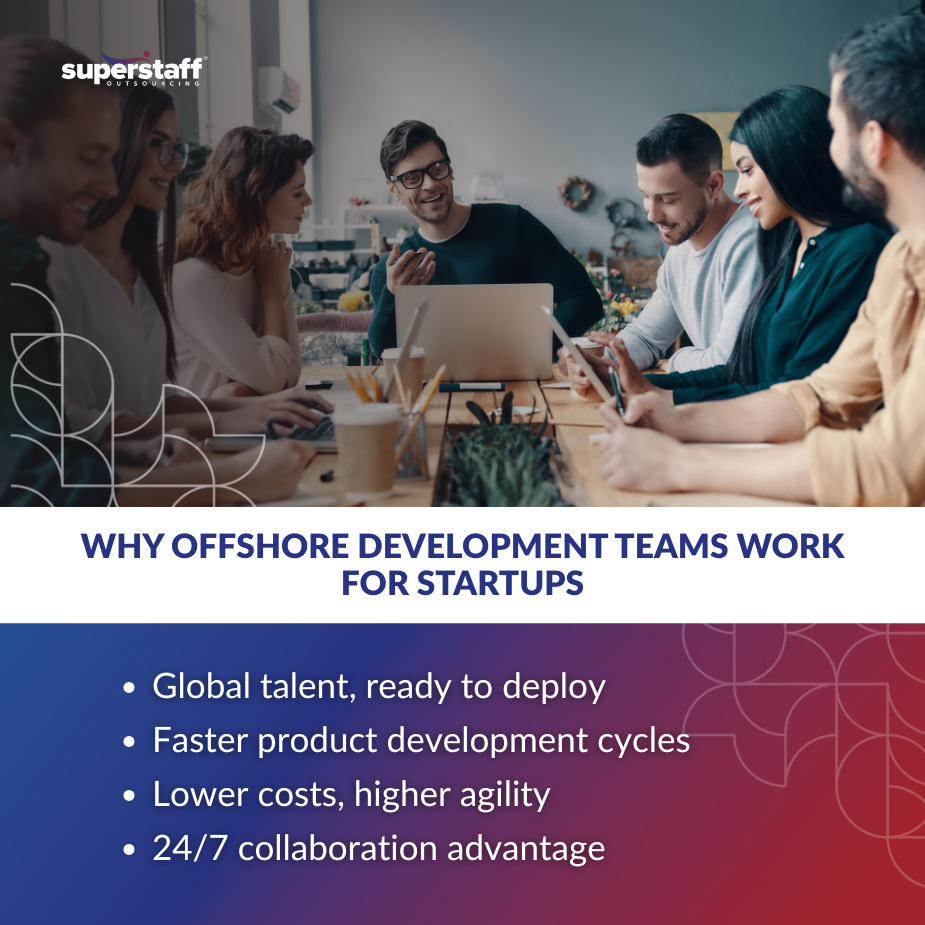
U.S. tech startups are in a race—one where speed, talent, and capital efficiency dictate success or failure. And in this high-stakes sprint, traditional hiring just isn’t cutting it anymore.
The shortage of skilled developers, rising labor costs in the U.S., and investor demands for rapid scaling are pushing startups to think globally. They’re no longer waiting in line for local talent—they’re building leaner, faster teams across borders.
An offshore development team is no longer a backup plan. It’s become a strategic engine driving smarter scaling. In this blog, we’ll explore how tech startups are unlocking new possibilities by partnering with global development talent—and why that trend is only accelerating.
The Talent Crunch Threatening Innovation in Tech Startups
For early-stage and growth-stage tech startups, every development sprint counts. But the brutal reality in the U.S.? There just aren’t enough developers to go around.
Startups in San Francisco, Austin, and New York face intense competition not just from each other but also from Big Tech giants like Google and Meta. Hiring the right developer can take months—time most startups don’t have. When they do land a hire, salaries and benefits often consume a disproportionate chunk of their budget.
And then there’s burnout. Startup employees, already stretched thin, often shoulder multiple roles. The result? Diminished code quality, slower releases, and high turnover.
That’s why so many are turning to the offshore development team model. It’s not about replacing in-house staff. It’s about filling the gaps quickly and sustainably.
Going Global: Offshore Teams Provide a Deep Bench of Talent

Talent shouldn’t have a zip code. That’s the belief driving the rise of the offshore development team. Startups are now casting a wider net—and finding gold in places like the Philippines and Colombia.
These countries offer more than affordability. They bring a robust supply of highly skilled, English-speaking engineers fluent in modern tech stacks. Whether it’s JavaScript, Python, DevOps, or machine learning, today’s offshore development services are powered by developers who can hit the ground running.
Startups benefit from faster staffing, round-the-clock development cycles, and access to niche skills that are often hard to find locally. With an offshore development team in place, businesses no longer lose momentum when a project expands or pivots. They just scale with it.
The Hybrid Advantage: Blending Offshore and Onshore Agility
Offshore doesn’t mean remote. Today’s smart startups are creating hybrid models—one that blends onshore strategic direction with offshore execution muscle.
The key to success? Agile workflows. Offshore development teams are integrated into sprint planning, daily standups, and asynchronous updates using collaboration tools like Slack, Jira, and GitHub. Everyone’s aligned, regardless of location.
This setup allows startups to move fast without sacrificing cohesion. Onshore leads maintain control over vision and roadmap, while offshore developers execute with precision, speed, and accountability. And because everyone’s operating on Agile principles, offshore teams are more than support—they’re collaborators.
With the right structure in place, startups find that their offshore development team doesn’t just meet expectations—it often exceeds them.
Scale Without the Stress: Cost Control With Room to Grow
Cash burn is the enemy of the runway. And when every dollar counts, startups must make intentional decisions about how and where to scale. Offshore development services offer a financial edge without sacrificing performance.
When startups hire offshore developers, they avoid the high costs of U.S. salaries, infrastructure, and employee benefits. That means fewer fixed costs, more room for strategic spending, and the ability to respond to changing market conditions.
Need to spin up a team fast? Offshore models scale quickly. Need to pause or pivot? Offshore partners allow you to dial down just as easily. That kind of elasticity is nearly impossible to replicate with a fully in-house team.
For many startups, this flexibility is the difference between surviving a downturn and folding. Offshore development teams keep innovation alive—even when markets get rough.
Time Is Product: Offshore Teams Accelerate Launch Cycles
Startups don’t have time for delays. Getting to market fast can mean the difference between leading a category or becoming irrelevant. That’s where the offshore development team once again proves essential.
With developers working across time zones, startups can maintain momentum around the clock. While one team finishes a sprint in the U.S., their offshore counterparts begin the next one. Releases happen faster. Bugs get resolved quicker. Features are tested and launched in days, not weeks.
And it’s not just about speed. Offshore development teams can prototype, A/B test, and integrate user feedback into sprints at a rapid pace. This accelerates innovation—and helps startups better meet customer needs without dragging down the core team.
That kind of fast feedback loop is something every startup wants. With the right offshore team, it becomes part of their daily rhythm.
Communication and Culture Are No Longer Barriers
There was a time when “offshore” meant distant and disconnected. That era is over.
Today’s offshore development team is a highly trained, culturally fluent extension of your internal operation. Developers in the Philippines, for instance, are not only proficient in English—they’re also trained in Western business etiquette and familiar with Agile, Scrum, and U.S. startup culture.
More importantly, the infrastructure to support seamless collaboration now exists. Cloud-based tools, real-time dashboards, and well-documented onboarding ensure everyone is on the same page—literally.
Startups no longer have to “manage around” offshore teams. They work with them. And that alignment creates shared goals, faster execution, and greater trust.
Offshore Is a Long-Term Strategy, Not a Stopgap
Smart startups don’t treat offshore as a temporary fix. They view it as a foundation for long-term success.
The best offshore development services for tech startups are structured to create continuity, not just capacity. Teams stay onboard for the long haul, absorbing product knowledge, understanding business goals, and documenting systems for future growth.
Some offshore teams even evolve into core business units—owning major components of the product roadmap or infrastructure. And as trust builds, founders delegate more. That frees up executive time to focus on vision, funding, and market strategy.
This isn’t outsourcing for the sake of savings. It’s partnering for progress.
Offshore Development Team: The Future of Scalable Innovation
U.S. tech startups are proving that offshoring isn’t just a cost-cutting tactic—it’s a growth strategy. The era of local-only teams is giving way to a more borderless, inclusive, and performance-driven development model.
The offshore development team solves what many startups face: limited capital, limited local talent, and unlimited pressure to deliver fast. With the right partner, startups gain flexibility, speed, and a competitive edge.
And here’s the truth—what began as a workaround has become a winning formula. Today’s most agile startups are scaling with global collaboration baked into their DNA.
Want to scale smarter like today’s most agile startups? Partner with SuperStaff to build a high-performing offshore dev team tailored to your tech goals.






